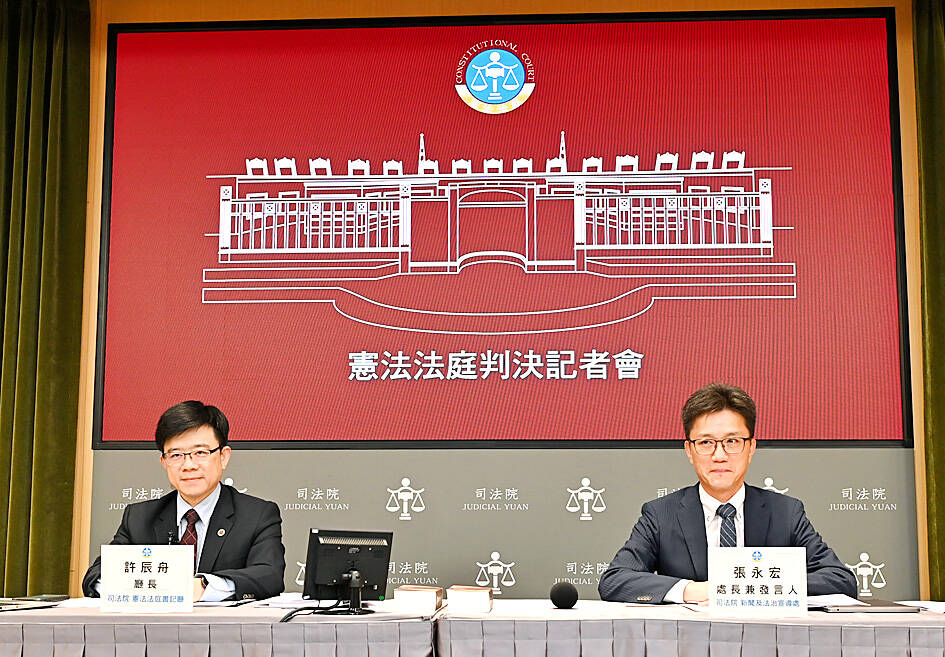The Constitutional Court yesterday ruled against decriminalizing defamation, but narrowed the scope of the crime to intentionally making a false statement and displaying gross negligence in verifying a statement’s truthfulness before dissemination.
Disseminating a false statement cannot be considered libel or slander if there was a reasonable effort to verify its truthfulness, the court’s abstract for Constitutional Judgement No. 8, 2023, says.
This means that the burden is on prosecutors to prove intent or negligence on the part of the defendant, it said.

Photo: Wang Yi-sung, Taipei Times
Defamation is defined by the Criminal Code as a reputationally injurious statement that is false or about a matter of no concern to the public, said Judicial Yuan President Hsu Tzong-li (許宗力), who also serves as the court’s presiding judge.
Information or evidence disseminated following a reasonable process of investigation and verification is exempt from defamation, even if untrue, he said.
The standard of tenability should be determined on an individual basis after weighing the right to reputation with the right to the freedom of speech, which are equally protected under the Constitution, he said.
When applied according to the above standards, the penalty for defamation does not contravene the constitutional principle of proportionality, he said, citing a precedent established by Judicial Yuan Interpretation No. 509.
The court on March 14 heard the debate for Chu Cheng-sheng (朱長生) et al versus the Judicial Yuan, which brought about the constitutional judgement.
The Judicial Yuan at the time said that the doctrine of legislative supremacy that grants precedence to the legislature’s authority to make laws over the courts should be applied to any conflict between the right to free speech and the right to reputation and privacy.
Individual liberties are sufficiently protected by the standards of actual malice and negligence established in Interpretation No. 509 and the due process of the criminal justice system, it said.
Defamation laws are widely utilized in other nations, and the right to protection against attacks on reputation needs to be upheld under current social conditions, it said.
The state has a justifiable interest to uphold democracy by punishing people who spread false statements about public matters to injure the reputation of others, National Taipei University professor of law Hsu Yu-an (徐育安) said.
The judgement, which excludes good-faith errors from punishment and targets those who intentionally spread falsehoods, is in keeping with the spirit of Interpretation No. 509 to limit state inference on speech, he said.
However, Hsu Chia-shin (許家馨), an assistant research fellow at Academia Sinica’s Institutum Iurisprudentiae, said that empirical evidence has shown that Interpretation No. 509’s definition of reasonableness is not clear to law practitioners.
The knowledge of falsehood or willful blindness toward it should be the defining element of criminal defamation, she said.
Interpretation No. 509 needs to be expanded to reconcile different opinions about the standard for the crime of defamation, National Human Rights Commission member Kao Yung-cheng (高涌誠) said.

CHAOS: Iranians took to the streets playing celebratory music after reports of Khamenei’s death on Saturday, while mourners also gathered in Tehran yesterday Iranian Supreme Leader Ayatollah Ali Khamenei was killed in a major attack on Iran launched by Israel and the US, throwing the future of the Islamic republic into doubt and raising the risk of regional instability. Iranian state television and the state-run IRNA news agency announced the 86-year-old’s death early yesterday. US President Donald Trump said it gave Iranians their “greatest chance” to “take back” their country. The announcements came after a joint US and Israeli aerial bombardment that targeted Iranian military and governmental sites. Trump said the “heavy and pinpoint bombing” would continue through the week or as long

TRUST: The KMT said it respected the US’ timing and considerations, and hoped it would continue to honor its commitments to helping Taiwan bolster its defenses and deterrence US President Donald Trump is delaying a multibillion-dollar arms sale to Taiwan to ensure his visit to Beijing is successful, a New York Times report said. The weapons sales package has stalled in the US Department of State, the report said, citing US officials it did not identify. The White House has told agencies not to push forward ahead of Trump’s meeting with Chinese President Xi Jinping (習近平), it said. The two last month held a phone call to discuss trade and geopolitical flashpoints ahead of the summit. Xi raised the Taiwan issue and urged the US to handle arms sales to

A magnitude 5.6 earthquake struck off the coast of Yilan County at 12:37pm today, with clear shaking felt across much of northern Taiwan. There were no immediate reports of damage. The epicenter of the quake was 16.9km east-southeast of Yilan County Hall offshore at a depth of 66.8km, Central Weather Administration (CWA) data showed. The maximum intensity registered at a 4 in Yilan County’s Nanao Township (南澳) on Taiwan’s seven-tier scale. Other parts of Yilan, as well as certain areas of Hualien County, Taipei, New Taipei City, Taoyuan, Hsinchu County, Taichung and Miaoli County, recorded intensities of 3. Residents of Yilan County and Taipei received

Taiwan has secured another breakthrough in fruit exports, with jujubes, dragon fruit and lychees approved for shipment to the EU, the Ministry of Agriculture said yesterday. The Animal and Plant Health Inspection Agency on Thursday received formal notification of the approval from the EU, the ministry said, adding that the decision was expected to expand Taiwanese fruit producers’ access to high-end European markets. Taiwan exported 126 tonnes of lychees last year, valued at US$1.48 million, with Japan accounting for 102 tonnes. Other export destinations included New Zealand, Hong Kong, the US and Australia, ministry data showed. Jujube exports totaled 103 tonnes, valued at